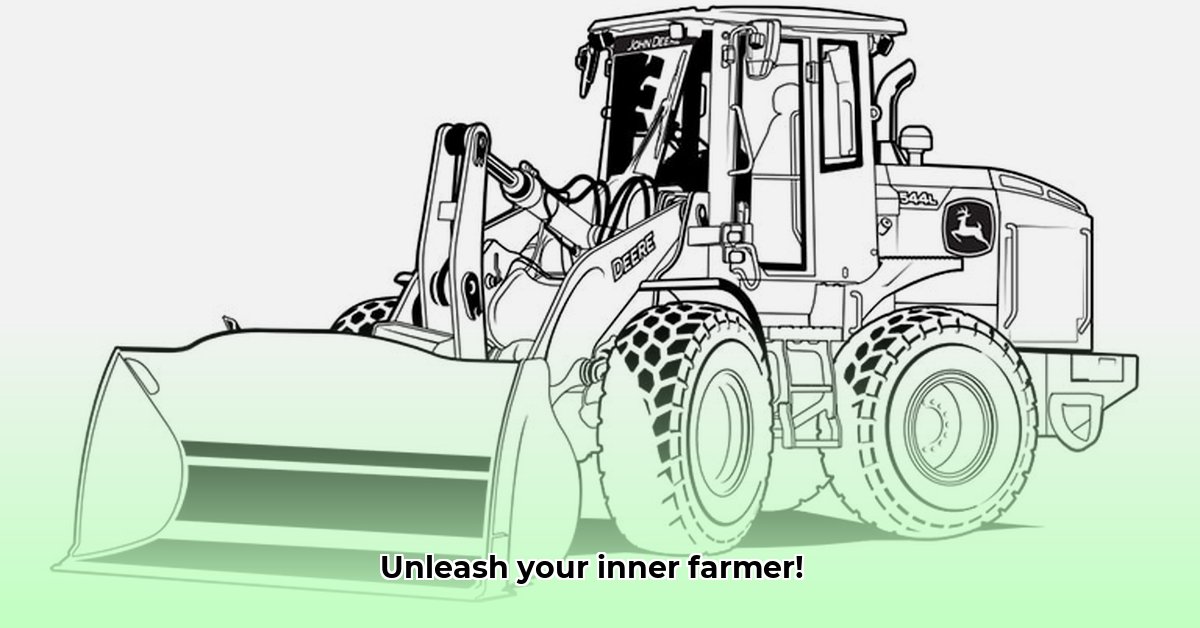
Want to teach your kids about sustainable agriculture in a fun, engaging way? Forget boring lectures! This guide shows you how to use free, printable tractor coloring pages to transform learning into an exciting adventure. We'll provide actionable activities, from simple coloring to creative crafts and thought-provoking discussions, designed to spark curiosity about food production and environmental responsibility. For even more tractor coloring pages, check out this great resource. Let's get those tractors coloring!
Downloadable Tractor Coloring Pages: A Colorful Journey to the Farm
Ready to unlock your child's inner artist? These coloring pages aren't just about crayons; they're a gateway to imagination and learning about where our food comes from. Here are some excellent resources for free, printable tractor coloring pages:
Monday Mandala: Offers simpler designs perfect for younger children, focusing on basic shapes and colors, ideal for developing fine motor skills and color recognition. [(Image of a simple tractor coloring page from Monday Mandala would be inserted here.)]
Supercoloring: Features more detailed and intricate tractor illustrations for older children, challenging their artistic skills and encouraging focus and precision. [(Image of a detailed tractor coloring page from Supercoloring would be inserted here.)]
Woocoloring: Provides a diverse selection of tractor coloring pages, including both simple and complex designs, catering to a wide range of ages and skill levels. [(Image of a tractor coloring page from Woocoloring would be inserted here.)]
Other Online Resources: A quick online search will uncover countless other free printable options. Remember to always check the terms of use before downloading and using any coloring pages.
Extending the Learning: Activities and Discussions That Go Beyond Coloring
Coloring is just the beginning! Let's transform these colorful creations into fun, educational experiences.
Activity Ideas:
3D Tractor Creations: Turn those coloring pages into three-dimensional models! Use cardboard, construction paper, or even recycled materials to build a miniature tractor. (Adult supervision is crucial for activities involving scissors and glue.)
Storytelling Adventures: Encourage your child to create a story about their tractor. Who's driving it? What crops are they harvesting? This sparks imagination, improves storytelling, and boosts language development.
Farm Diorama: Using a shoebox or similar container, create a miniature farm scene around the colored tractor. Include farm animals, crops, and other elements to create a complete farm ecosystem.
Simple Science Experiments: Connect the coloring activity to real-life farming with easy experiments like planting seeds or observing bean sprouts. This makes learning about plant growth tangible and exciting.
Discussion Prompts:
Tailor questions to your child's age:
- Preschoolers: "What color is the tractor?" "What are the animals doing?" Focus on colors and basic actions.
- Elementary Aged: "Where does our food come from?" "Why are farmers important?" Introduce the concept of food production in a simple, engaging way.
- Older Children: "How can we help farmers protect the environment?" "What are some sustainable farming practices?" Explore environmental responsibility and sustainable agriculture.
Adapting for Different Age Groups
Personalize the experience!
- Preschoolers (3-5): Simple coloring, basic shape recognition, short, playful discussions.
- Early Elementary (6-8): More detailed coloring, storytelling, slightly more complex crafts.
- Older Children (9+): Intricate coloring, in-depth discussions on sustainable practices, research-based projects.
Assessing Learning and Impact
Forget formal assessments! Observe children's engagement and the details in their artwork. Ask open-ended questions to gauge their understanding. Their enthusiasm and creativity are the true measures of success.
By combining creative coloring with engaging activities and thoughtful discussions, you'll foster an appreciation for farming and its importance while developing essential skills. It's a fun way to connect children with their food and the environment, planting the seeds for a sustainable future!